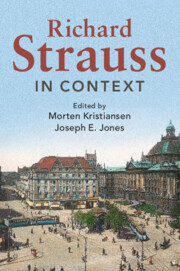Book contents
- Richard Strauss in Context
- Composers in Context
- Richard Strauss in Context
- Copyright page
- Contents
- Figures
- Notes on Contributors
- Preface
- Note on Translation
- Part I Family, Friends, and Collaborators
- Part II Career Stations
- Part III Cultural Engagement and Musical Life
- Chapter 14 Strauss as Reader
- Chapter 15 Antiquity
- Chapter 16 Philosophy and Religion
- Chapter 17 The Allgemeine Deutsche Musikverein
- Chapter 18 The Genossenschaft Deutscher Tonsetzer
- Part IV Professional and Musical Contexts
- Part V In History
- Part VI Artifacts and Legacy
- Further Reading
- Appendix: Letters Bibliography
- Index
Chapter 14 - Strauss as Reader
from Part III - Cultural Engagement and Musical Life
Published online by Cambridge University Press: 08 October 2020
- Richard Strauss in Context
- Composers in Context
- Richard Strauss in Context
- Copyright page
- Contents
- Figures
- Notes on Contributors
- Preface
- Note on Translation
- Part I Family, Friends, and Collaborators
- Part II Career Stations
- Part III Cultural Engagement and Musical Life
- Chapter 14 Strauss as Reader
- Chapter 15 Antiquity
- Chapter 16 Philosophy and Religion
- Chapter 17 The Allgemeine Deutsche Musikverein
- Chapter 18 The Genossenschaft Deutscher Tonsetzer
- Part IV Professional and Musical Contexts
- Part V In History
- Part VI Artifacts and Legacy
- Further Reading
- Appendix: Letters Bibliography
- Index
Summary
Composers have long engaged with texts, but the extent to which they have consciously constructed a literary cosmos around their work and private lives has radically changed over the last two centuries. For modern composers, it has been increasingly common to read not merely to enrich intellectual horizons or scour for musically settable material, but as a means to tap into a reservoir through which the reception of their music can add a layer of cultural legitimation. Viewed against this wider context, the extensive library that Strauss collected, read, and selectively presented to audiences in various musical formats symbolizes neither the physical legacy of a lifelong bibliophile (Brahms) nor the quiet spiritual refuge of a well-heeled bourgeois (Elgar). Rather, it constitutes the material footprint of an intellectual disposition toward the world that stems from a deeper-held set of beliefs about the cultural mission of literature in Western European history.
- Type
- Chapter
- Information
- Richard Strauss in Context , pp. 127 - 136Publisher: Cambridge University PressPrint publication year: 2020

